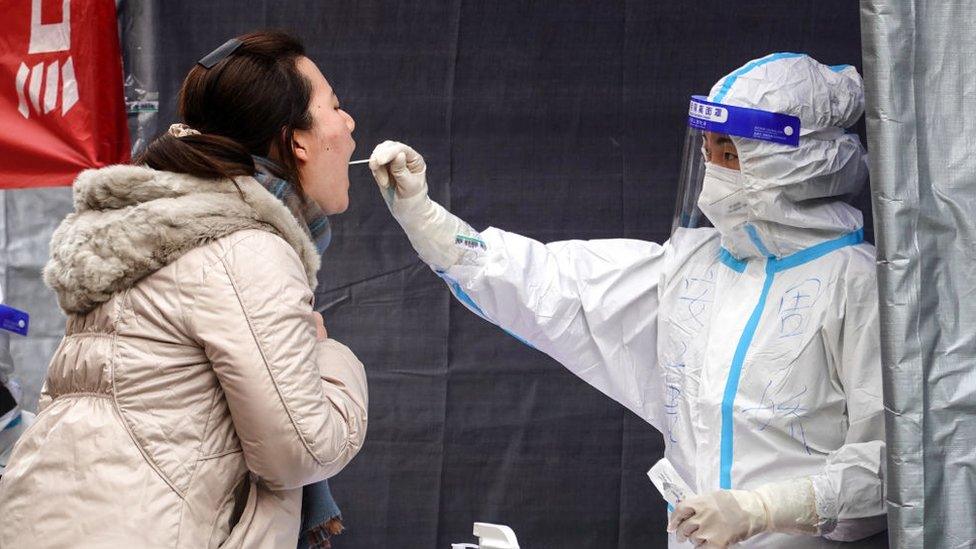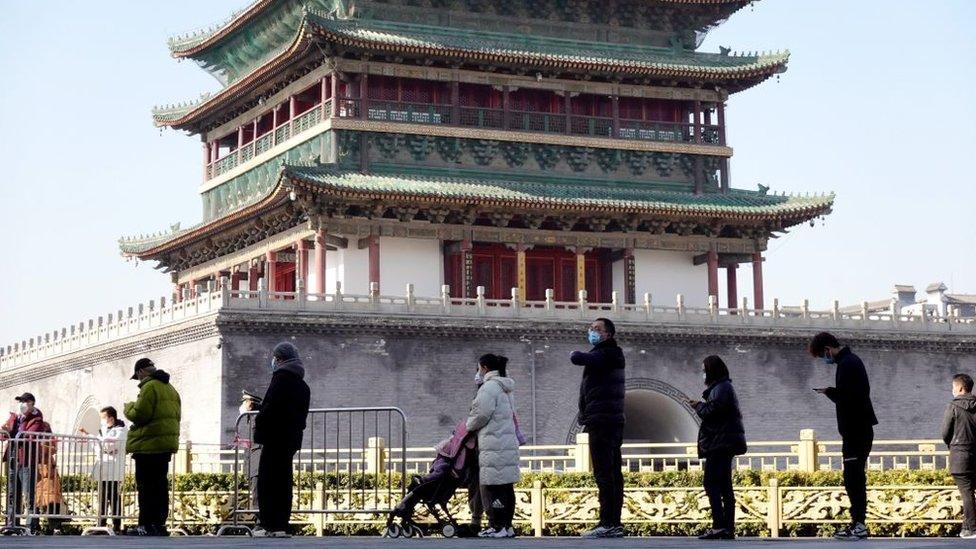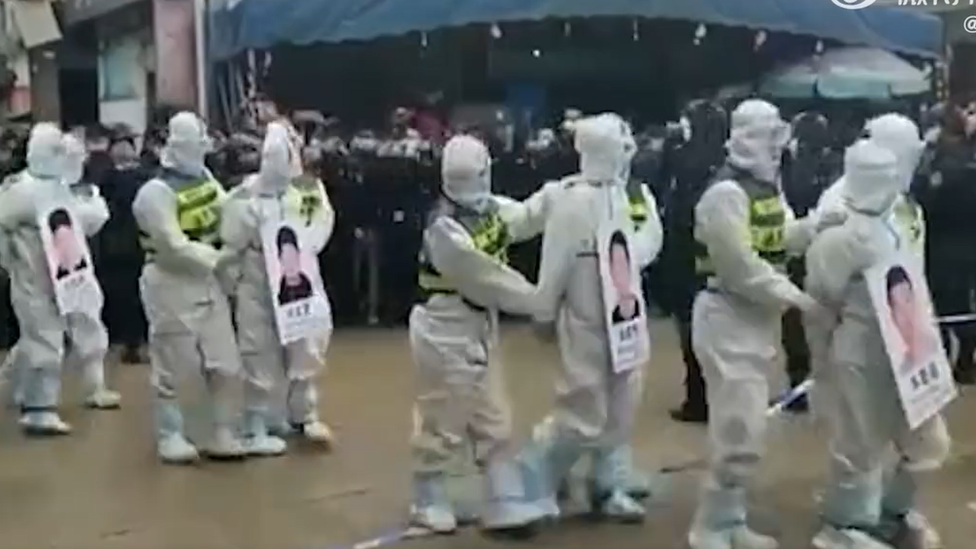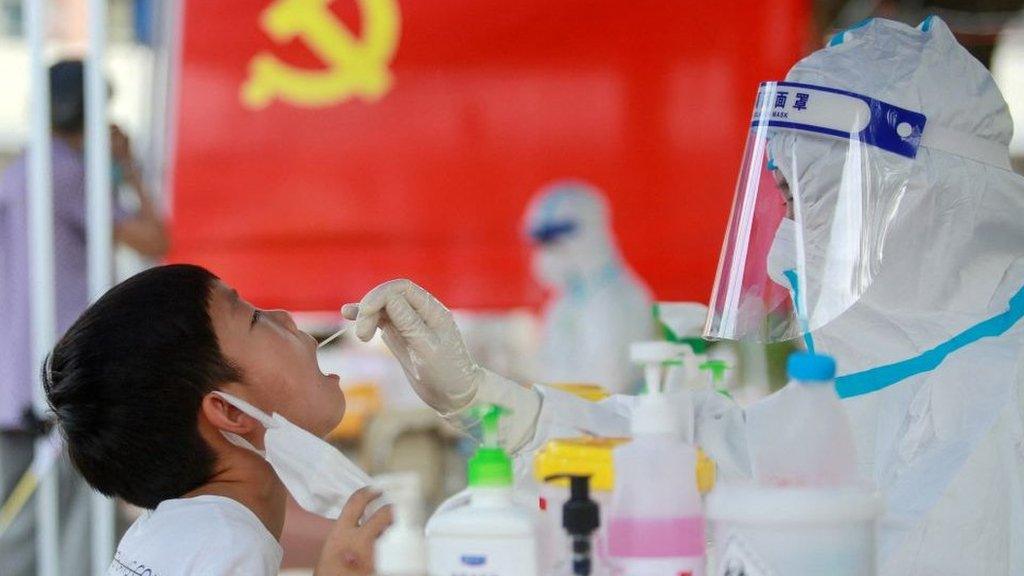Xi'an: Cries for help and food in quarantined Chinese city
- Published

Millions of tests have been conducted in Shaanxi province where Xi'an is located
Some residents under lockdown in the Chinese city of Xi'an say they do not have enough food, even as officials insist there are adequate supplies.
More than 13 million were ordered to stay at home last week as authorities sought to battle a Covid outbreak.
But compared to other lockdowns globally, locals cannot go out even for essential reasons like buying food.
The government is delivering supplies but many on social media say they are yet to receive them and are struggling.
The lockdown on the northern city of Xi'an is in its ninth day. The city's outbreak is the worst China has seen in months amid its zero-Covid strategy.
Initially, the restrictions had allowed one person per household to venture out once every two days to buy food and other basic supplies.
But the rules were tightened on Monday - banning residents from leaving at all except to get tested for Covid-19.
In past days, people have taken to the Weibo social media platform to call for help with getting food and other essentials. Many said they hadn't received their government supplies yet.
"I heard other districts are gradually getting supplies, but I didn't get anything. My compound bans us from going out. I ordered some groceries online four days ago, but no sign of getting it at all. I haven't been able to get any vegetables for days," read one comment posted on Friday.
Another person said: "The allocation is so uneven. The district I'm based in hasn't got anything. We are told to group up and order together. The price is very high as well."
One video taken this week which has been circulating online shows residents in a Xi'an compound arguing heatedly with police over the lack of food.
A man tells authorities that his family has run out of food, and a woman can be heard saying: "We've been locked down for 13 days. Resident's basic life can't be sustained. We queued for three to four hours [to buy vegetables]. But they don't allow it to be sold anymore."
Allow X content?
This article contains content provided by X. We ask for your permission before anything is loaded, as they may be using cookies and other technologies. You may want to read X’s cookie policy, external and privacy policy, external before accepting. To view this content choose ‘accept and continue’.

State-owned newspaper Global Times said, external that in some places, food was being delivered to housing compounds' entrances but there were not enough volunteers to deliver the supplies to residents' doorsteps. There was also a citywide shortage of deliverymen as many drivers were under quarantine themselves.
Authorities had admitted on Wednesday that "low staff attendance and difficulties in logistics and distribution" had led to problems providing essential supplies to the city.
By Thursday however, the country's commerce ministry told reporters that Xi'an's residents had "sufficient" access to essential supplies, AFP news agency reported.
State television outlets also broadcast images of workers in hazmat suits sorting various essential food items like eggs, meat and vegetables into plastic bags, before delivering them to residents door-to-door.
"We got free groceries from the government. It's actually quite a lot. It's enough for a family to eat for three or four days," one person who received their supplies wrote on Weibo.
China's adoption of a strict zero-Covid strategy saw the city closing bus stations, cancelling outward bound flights, and conducting millions of tests in Shaanxi province, where Xi'an is located.
Xi'an has logged more than 1300 virus cases since 9 December. The latest outbreak has thrown into doubt China's ability to maintain its zero-Covid approach as it gears up to host the 2022 Winter Olympics in February.
China has termed Covid "the biggest threat" to the major international sporting event.
The country, where the virus was first recorded, has now confirmed more than 131,300 cases and 5,699 deaths, according to the latest figures from the World Health Organization, external.
You may also be interested in:
Coronavirus: How China's using its controversial surveillance network to tackle the outbreak
Related topics
- Published22 December 2021

- Published29 December 2021

- Published6 August 2021
